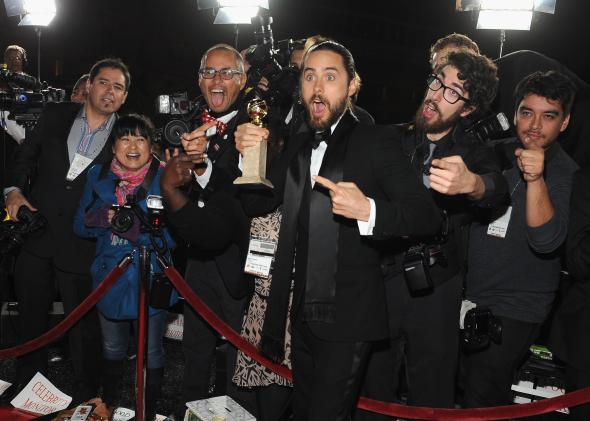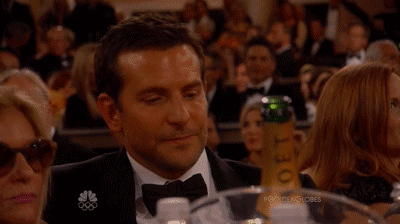Jared Leto and Michael Douglas Disappoint at the Golden Globes

Photo by Angela Weiss/Getty Images for NBCUniversal
Based on the headlines alone, you’d be excused for thinking that Sunday night’s Golden Globes ceremony was an unmitigated win for LGBTQ people. Behind the Candelabra and Dallas Buyers Club—two of the better films of 2013 that featured, though in thoroughly different keys, pretty good portrayals of queer characters—each received numerous nods and a handful of awards. It is undoubtedly a good thing when movies that address, in their own terms, serious issues like the AIDS crisis, the transgender experience, and the seductions of a particularly gaudy closet garner this kind of recognition—the discussions those films inspire provide an opportunity to transform art into political awareness. But, as we saw last night, the success of queer movies also provides an opportunity for tone-deaf straight actors to run their mouths.
Michael Douglas (Liberace in BTC) and Jared Leto (Rayon, a transgender woman, from DBC) are receiving some fair criticism today for their awkward and somewhat insensitive acceptance speeches. Douglas, in taking the award for Best Actor in a TV movie, recalled his reaction when director Steven Soderbergh first approached him about playing the piano man on the set of Traffic. “Being the paranoid actor that I was, I thought maybe I was mincing a little bit in the part that I was doing.”
Critics have thus far pointed to this “mincing” line as the more blatantly offensive of the two speeches, especially considering Douglas’ chuckling about tops and bottoms at last year’s Emmys. I’ll agree that such an old-fashioned descriptor for effeminate gay men sounds like a masculinity preservation maneuver, but reading over the whole sentence, I think it’s also possible that Douglas’ worry was focused more on his acting in Traffic than on the mortal peril of mincing in general. (Also, Liberace did, in fact, mince, and acknowledging that is not a crime.) Quibbling aside, though, the choice of words was unfortunate.
Worse to my mind was Jared Leto’s self-centered and juvenile acceptance of the prize for Best Supporting Actor. Picking up on one of the running jokes of the night, Leto began by noting that he did not wear any prosthetics in Dallas Buyers Club and that the “tiny little Brazilian bubble butt was all mine.” Iffy, considering the role he was being feted for, but not terrible—if only he had stopped there. “It was a very transformative role. I had to do a lot of things to prepare. One of the things I did was wax my entire body, including my eyebrows. I’m just fortunate it wasn’t a period piece so I didn’t have to do full Brazilian. Ladies, you know what I’m talking about; and so do some of you men, I think.” He then went on to welcome himself back into Hollywood prominence and to thank, in an afterthought, “the Rayons of the world” for inspiring him to get there.
The audience (except for Bradley Cooper) laughed at all this, but they shouldn’t have. As Daniel D’Addario points out in Salon, “It’s an actor’s job to prepare for a role in whatever way the script demands; it may have been difficult for Leto to wax his entire body, but it’s sort of a weird punchline for a person whose entire role was about body discomfort and the painful modifications one must make to feel okay with oneself.” A very weird punchline indeed, and one that evinces very little in the way of maturity or fellow-feeling for the type of human being he was paid—and now honored—for portraying.

And more than slips of language, that’s the thing that grates most about these unintentionally irksome remarks. These are professional actors whose job it is to get inside the lives and heads of their characters in order to do them justice on screen. Douglas and Leto, by my estimation, both did a solid job of that in their respective movies—which makes the question of how they managed to leave the sensitivity and nuance needed for those performances back on set particularly vexing.
Moreover, it cannot be lost on them that some significant percentage of the recognition these films—and by extension, they—are enjoying is due to the accrual of liberal cred, queer people being the current favored minority of the left. It’s jarring, then, to witness people who are in no small part on stage because they were, in a professional sense, lucky enough to play a femme gay man or transgender woman—real figures whose existences in this world remain very precarious—treat those roles like a little light-hearted drag, easily accomplished with a day at the spa or a bit of studied lightness in one’s loafers.
A more generous viewer might argue that awards speeches are heady, rushed events—linguistic precision and political thoughtfulness are surely a challenge in the midst of required thank-yous and a pushy orchestra. Fair enough. But watching these clips again and imagining how easy it would have been for Douglas and Leto to get it right, I’m beginning to feel like the privilege of playing a queer person in an era in which it increasingly affords prestige should come with a small burden: In the event that you get accolades for your professional “bravery,” make sure you have some basic notes prepared that won’t mock the very people of whom you’re supposedly a champion.

